April 26 - 28, 2003
end of the land, grass, stones, and a part-time island
| Cornwall April 26 - 28, 2003 end of the land, grass, stones, and a part-time island |
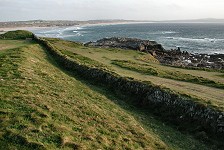 |
||
| St. Ives Bay |
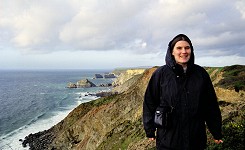 |
||
| I always wanted to show you Cornwall! |
C: Have you ever read Jamaica Inn by Daphne du Maurier? Full of moors, mystery, dangerous cliffs and repulsive criminals? Perhaps this very novel attracts thousands tourists to Cornwall, but most likely it is a Mediterranean atmosphere of a romantic coastline - so much different from the rest of cold, rainy England.
S: Books from English environment always made a certain impression on me, which I got quite confirmed
during this, my very first visit to London: wet breeze along the Thames drizzled down on me, leaving behind
a metropolitan depression and a certain downtrodden tiredness. Beaming sunshine, which welcomed us into our
first real vacation Saturday, came to our symbolic rescue. We happily turned our car towards west, crawling
along M25 past Heathrow airport, so much feared by British social engineers for causing traffic jams
that they preventively slow it down by posting low limits, thus causing an otherwise fluid stream of cars
to stutter and jam, the very thing they're afraid of.
Driving on the left side of the road became after two days much more natural than on our first evening,
and other drivers accordingly ceased to feel urges to honk at me, despite my rather uncontrolled swerving near
exits and roundabouts. Andover is a small town on our path, where we solved our problem with remaining
capacity of Carol's camera by buying an extra memory card; it would come handy later during our vacation.
It is a pleasant and comforting feeling, now that standards around the world got universal enough, and
digital photography became commonplace even at a country shopping center.
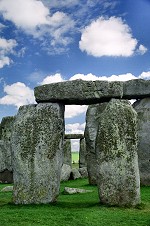 |
||
| A Celtic gate at Stonehenge |
C: And so we headed out of London. Our first intermediate destination was Stonehenge, of course. I told Sid to expect expensive admission fee, a wire-mesh fence, and hordes of tourists -- maybe as we were ready for the worst, we quite enjoyed the mysterious stones. Still -- at a safe distance, never leaving a designated path. It seems to be the fate for all famous monuments - they eventually get out of physical reach, emptied of people, carefully isolated from the world.
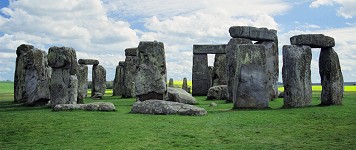 |
||
| Stonehenge |
S: Stonehenge, an ancient gathering of druid stones in a field north of Salisbury and our first planned attraction, stood erect just like I imagined it, quite arrogant in a middle of a quiet, gently rolling and very green country, right next to a four-lane carriageway. As expected, it was also thoroughly "depleted" by countless legions of tourists; should you seek a Celtic mystery there, be aware that some 6 pounds that you must pay to get behind an outer fence won't buy you any. Mostly Asian visitors moved about in an organized fashion, incessantly taking pictures while surrounding the monument on a single loop path. A nice contrast of gray, worn out, impressive stone blocks against a dramatic, cloudy sky, on a backdrop of primary green grass and a loudly yellow rapeseed field, was no less worthy our attention than the inner fence, similar to an electric one used to keep cattle penned. It only symbolically prevented us from approaching the circle of stones within, but no-one did. The keepers of the place obviously change its diameter from time to time, thus creating a variable grassy path, which will never wear out.
C: We reached Cornwall by evening. First rushing to secure a hotel room at Redruth, we then drove out to catch a sunset by the shore at Reskajeage, and to see a lighthouse at Godrey Point. We had, however, underestimated a simple fact, that is, the day being a Saturday. All pubs seem to have some sort of "entertainment" (anything from disco dancing to a ball with a raffle), hence beginning with a certain, always rather early hour, they don't serve dinners. Got rescued from starving by a pseudo-Mexican, pseudo-exotic food place.
S: Western shores of many places on Earth repeat in their abruptness and cliffhood, which makes one immediately
compare one with another. Thousand feet of elevation of the northernmost point of continental Europe at Nordkapp
(which I was not yet to return to, despite my longing to do so since 1991), neckbreaking slopes of California's Big Sur or
frosty rain forest over the seas of Olympic Peninsula in the state of Washington, as well as rough cliffs of Cornwall
face the eternal winds from the west, from the ocean. These are the places where the world extending behind us, finds its sudden end;
are you courageous enough, you pitiful pilgrim? Ye who discover their paths turning back to where you came from, embark on a
rickety boat towards the horizons which promise space that you could not find at home!
And wave after wave arrives, storm alternates with sleet, just to nibble away another layer of sand and rock. Walls collapse,
towers crumble, roads and pavements retreat from the ocean; once or twice per generation, by stealth. We stood on
the very edge, surrounded by humble flowers of coastal vegetation and by intrusively wet air of an April evening.
Sun was not even trying to burn through thick, yellowish clouds slowly rolling over the shores, invoking the image of
a sodium street lamp in a fog. If I wished to live here, my house would need to be made of stone, I thought.
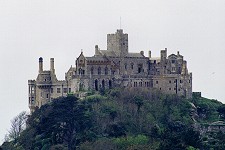 |
||
| Detail of St. Michael's Mount castle |
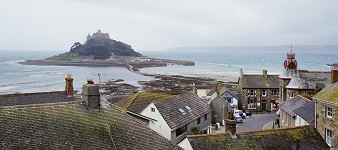 |
||
| Ancient town of Marazion, with the island of St. Michael's Mount |
C: Morning came with beautiful weather (a miracle one must never underestimate in England),
for we could see all the way to the northern coast from our hotel room. Yet we went south, to
St. Michael's Mount.
This part time island, part time peninsula, is by far not as famous as Mont-Saint-Michel of Brittany, France,
and is adequately much smaller, too. Still it offers a similar experience.
During low tide it is easy to reach on foot, but should you bide your time, you get marooned until the next low tide,
lest you use a service of a local amphibian vehicle, which can bring you back to a mainland beach.
Assuming the service is available. A sign announced it was not on this Sunday, so we followed instruction and rushed back
to watch the narrow isthmus being eventually wholly flooded. Not all tourists complied, some becoming stranded
on the island with no available accommodations, some even wading through a foot of water out to the island. And so we hiked
a nearby hill and watched the locals start the funny amphibian "boat with wheels"
and move obnoxious daredevils back to safety.
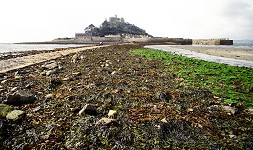 |
||
| Way to St. Michael's Mount is quite wide during low tide |
S: But first we, too, stumbled across some hundred yards of a narrow, winding, road like a spinal ridge of a dragon, built with large flat stones. Beware of your foot dropping on a leaf of kelp, so abundant here since the last tide; smooth slimy plants would down you with the efficiency of many banana peels. The castle, standing tall atop the mountain, remained out of reach. National Trust offers tours there, yet it is still inhabited by its former owners, and though visiting public must be an important source of income, I understand that they reserve Sunday as a day when they are protected from intrusive tourists. So we only inspected a few commercial buildings at the foot of the mount, featuring ice cream stands, ticket registers, and a tiny marina. A brisk old man who kept gazing out onto the Mount's Bay, chatted with us about weather and miracles of the world, telling us about a regatta that was presently taking place there. And indeed, tiny sailboats passed one by one by an inconspicuous buoy nearby. The man complained that the local government forbade them recently to shoot blanks from a small gun for the purpose of signaling to the boats, which used to be a long time tradition and could be well heard all across the bay. Ignorant tourist used to get alarmed by the sound, and now with the omnipresent terrorist threat, they tended to panic. Which explained the source of a strange horn sound we heard before -- it was the whine of a starting signal. Thanks to fears of bloodthirsty intruders, we are now all poorer by yet another small, merry, innocent fun, banned.
C: The warmth of the Atlantic was a surprise. Back home in California, by some ten latitudinal degrees closer to the equator,
Pacific Ocean has whole 15°C, while in rainy, cold England, the Atlantic Ocean feels much warmer.
That is what Sid claimed, after he (not entirely voluntarily) tried it on his own skin, trousers and boots at
Kynance Cove, where he got washed by a sneaky high surf.
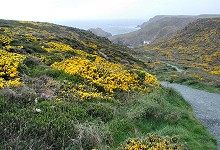 |
||
| Merry flowers decorate Cornwall coastline |
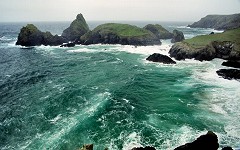 |
||
| Kynance Cove and its "warm" waters |
S: If you imagine the larger one of the two main British Isles being an upright sitting cat (you'd need
some fantasy there as Scotland on the north does look even remotely as a cat's head), then Cornwall would
be a tail running from the base of the cat to southwest. One finds here, about 30 miles apart from one another,
Lizard Point a Land's End, the former most southern, the latter most western, points of England.
Both equipped with inevitable lighthouses, parking lots and lookout platforms, from whence one may comfortably
observe lively Atlantic Ocean (enriched at Land's End by a mini-archipelago named Longships),
where, if you pay closer attention, you can always find some ships -- English Channel is an important naval route
and many vessels on their way from English and West European ports must run near a tip of Cornwall.
Finally, the most impressive landscape hides, in both cases, behind the next fold of the cliffs -
picturesque coves with dramatic rocks, perpetually washed with frothy surf (it really was not cold at all),
or a plateau crisscrossed with stone walls -- to prevent omnipresent sheep from roaming the land unchecked --
protecting in its midst menhirs and a circle of standing stones named Merry Maidens.
With advancing dusk we arrived at a famous small port of Mousehole (the locals are rumored to demand proper
pronunciation, which could spell moosel); streets surrounding a marina built of stone are so narrow that
only a mouse could slip through. But, thanks to my "exceptional driving skills", we did not get stuck here.
Weathered by constant wind, noticeably soggy from unending drizzle, which followed our expedition during the whole day,
we decided not to tempt fate with (probably pointless) asking for a warm meal on Sunday after eight p.m.,
and ate some rations from previously accumulated stash; cheese, bread, grapes. England certainly does not belong
to countries where I would fear gaining weight.
| Copyright © 2003-2005 by Carol & Sid Paral. All rights reserved. |